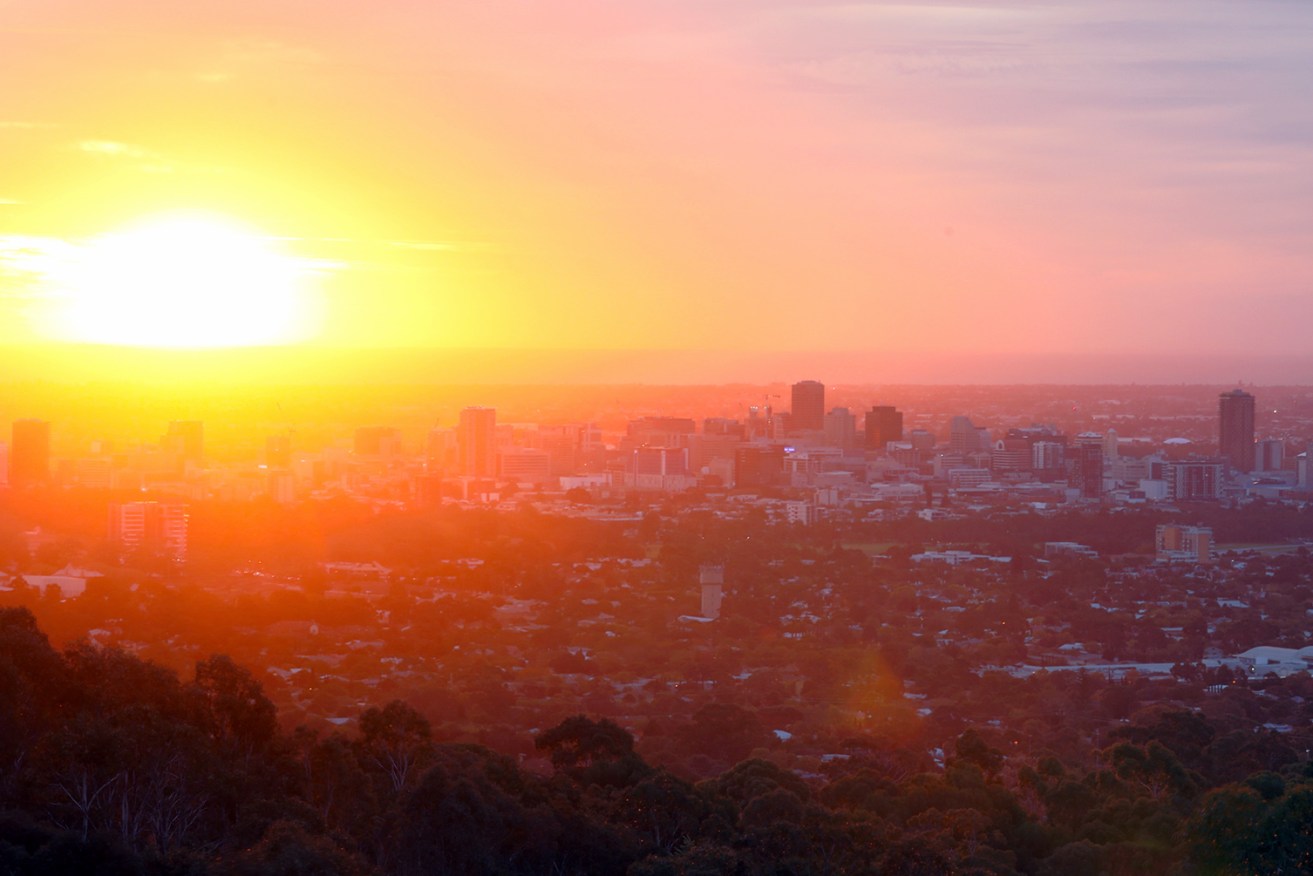Experts demand ‘urgent’ climate action in SA planning code
South Australia’s new planning regime has “no coherent climate change narrative” and must be “urgently” revised, a panel of legal and environment experts has urged, warning: “Business as usual does not cut it.”

Sunset over Adelaide. Photo: Tony Lewis / InDaily
The final phase of the Marshall Government’s new Planning and Design Code went live in March, despite objections from a working group on Land Use Planning and Climate Change, whose draft report to parliament’s Legislative Review Committee in January lamented the scant references to climate impact in the 7500-page code.
A final report from the group, lodged earlier this year, says while the Planning, Development and Infrastructure Act provides for direct and indirect action on climate change, “the Act does not address the issue of climate change in detail”.
Working group spokesman David Cole, an experienced environmental lawyer and former director of the Centre for Environmental Management and Compliance at the University of South Australia, told InDaily the new planning system “largely fails to confront the climate change challenge” arguing the planning legislation and processes established under it “therefore require urgent review”.
“Put simply, there is no coherent climate change narrative in the new land use planning system in South Australia,” he said.
“Business as usual does not cut it.”
Legislative Review Committee chair Nicola Centofanti said the committee had received over 100 written and oral submissions, all of which would inform its final report to parliament, which was currently being drafted.
However, a spokesperson for Planning Minister Vickie Chapman – who rolled out the new system after taking over the portfolio from Stephan Knoll last year – suggested the group’s submission would be considered by the Planning Commission in coming months and could inform future amendments to the code.
“The Planning and Design Code is but one of the State Government’s many initiatives to address climate change,” they said.
“It contains a range of policies that tackle climate change challenges both directly and indirectly, encouraging sustainable and environmentally sensitive development.
“However, the State Government has committed to regularly reviewing the Code, to ensure it reflects and supports planning objectives for the State [and] measures to address and tackle climate change will be a key consideration during these reviews.”
The working group’s renewed push for action follows last week’s Intergovernmental Panel on Climate Change (IPCC) report, which found global warming would likely increase by 1.5C in less than a decade based on its current trajectory, in findings dubbed by United Nations secretary-general Antonio Guterres as a “code red for humanity”.
“South Australia is not immune to these risks and potentially disastrous impacts,” the SA working group said in a statement today.
The group said its final report “recognises that it is the way we use land that generates carbon emissions and that the use of land now and into the future will also determine how we manage the impacts of climate change”.
“It follows that land use planning systems are a vital cog in the machinery to reduce greenhouse gas emissions and assist communities to adapt to the inevitable consequences of climate change,” they said.
“It’s also worth recognising that well over half of the buildings that exist today will still exist in 2050 [and] these existing buildings and infrastructure have a massive carbon footprint that needs to be addressed in the coming decades.
“Why would we even consider allowing more such developments to be constructed when we have set such an ambitious target and we have so little time to achieve it? The role of the planning system in addressing climate change is clearly critical but analysis of what the SA Planning and Design Code is doing about this suggests that the verdict is ‘not enough’.”
Chapman has previously disputed this claim, writing in the Law Society of SA’s Bulletin in May that “the State Planning Policies and their impact on the design of the Code present the best mechanism to shape the built environment for climate resilience”.
“It is unfair to suggest that climate mitigation and adaptation policies do not feature as a priority for the Government or the State Planning Commission… the Code contains a suite of policies that help mitigate climate change, including a nation-leading set of residential infill policies,” she wrote.
“Given the reliance on the Code for the assessment of almost all development in the state, the application of the Code will have the most impact in ensuring climate-focused outcomes are considered in new development submissions.”
But Cole told InDaily Chapman “didn’t address our argument that the process and system itself has not been developed so that when it comes to making final development application decisions, climate change will have a clear role and a high priority”.
“The development assessment outcomes are not assisted in that sense by the current plan – what I think we need is first a recognition by the Government that this is a significant issue which requires urgent attention, particularly in light of the IPCC report,” he said.
“We would say the planning system itself needs comprehensive review, so that there’s a clear, defined climate change message through the planning system… probably what should and could be done in a relatively short space of time is attention to the code, because that’s the instrument which must be taken into account by relevant planning authorities when making a decision.
“Immediate attention should be paid to that body of rules so that climate change is front and centre when they’re making a decision about a development application.”
The Working Group comprises academic lawyers, experienced legal practitioners and an academic planner “who share an interest in planning law and climate change”.
It includes members of the Environmental and Natural Resources Law Research Unit at the University of Adelaide Law School.




